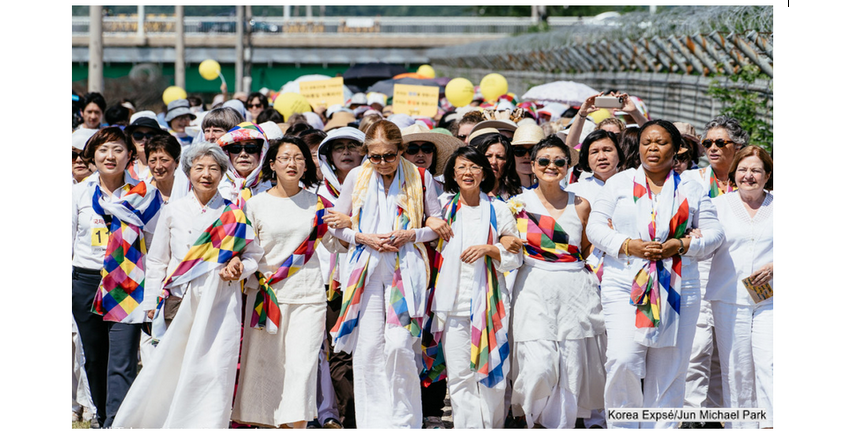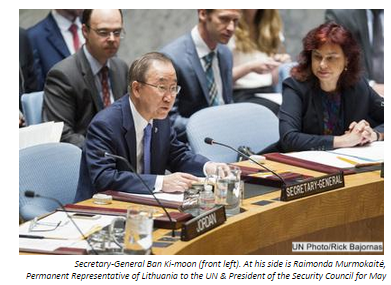June 2015 E-News: Women Cross Demilitarised Zone (DMZ) on Korean Peninsula for Peace
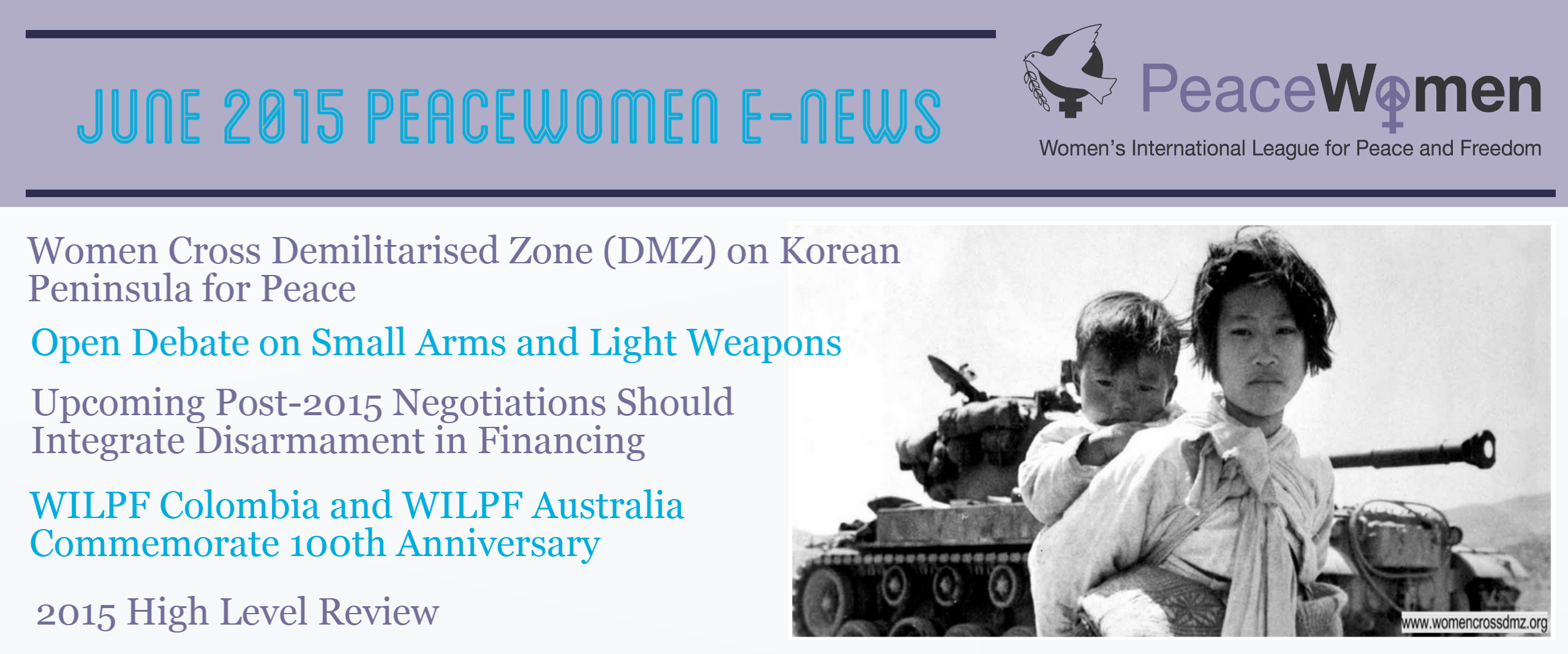
Women Cross Demilitarised Zone (DMZ) on Korean Peninsula for Peace
Editorial by Kozue Akibayashi, International President, WILPF
On 24 May 2015, the International Women’s Day for Peace and Disarmament, approximately 30 women from 15 countries crossed the Demilitarised Zone (DMZ), which serves as a buffer between North Korea and South Korea, and made a powerful call for peace in the Korean Peninsula. I was among these feminist peace activists including Gloria Steinem of the United States, two Nobel Peace Laureates, Mairead Maguire of Northern Ireland and Leymah Gbowee of Liberia, and others. Together, we demanded an end to war apathy and inaction and together, we demanded creative and powerful actions for peace.
Unending war has become an expected way of life between North and South Korea. The international community has, too often, ignored human rights, peace, and security in the region, and instead primarily attends to the region’s economic situation. Scant attention is paid to the fact that North and South Korea are yet to sign a peace treaty for the war waged over 50 years ago on the Peninsula in which millions of people were killed. This perpetuates the division of people who have suffered the effects of brutal Japanese colonial rule in the early 1900s and the succeeding aggression by Japan and occupation by the United States. Even to this day, millions of families are separated by the 38th parallel north.
The idea of the peace walk was conceived by Christine Ahn, a Korean-American peace activist, upon hearing news of the 2009 flash flood in North Korea. As a result of the North Korean government opening the river gates without informing the South Korean government, six South Koreans lost their lives in the ensuing flood. Afterwards, Ahn was determined to gather women on this walk who have worked for peace and the human rights of women to reaffirm the significance of restoring dialogue, rather than dependence on force, which has ultimately led both sides towards an intensive arms race. The peace walk included a one-week-long trip full of intense experiences that I am still in the process of absorbing. Technically under armistice, militarism in both countries is profound. North Korea is a country that is often portrayed as enigmatic or incomprehensible. As a Japanese national however, I saw many legacies of the colonialism of Japan in the authoritarian state. The human rights abuses in North Korea, which we strongly condemn, needs to be viewed through the lens of the consequences of a highly militarised society where the priorities of the military outweigh the basic needs of its people.
Addressing the division and bringing peace to the Korean Peninsula is not only the task for North and South Korea, but a responsibility of the international community. Peace is not an abstract idea. Peace has concrete images for us to envision achieving. Uniting separated families for decades is such an image. So is building mutual understanding. By crossing the DMZ, I believe we were able to make a small step towards peace in the Korean peninsula.
Raise your voice! Join the movement. End the apathy. Demand change. Twenty countries fought in the Korean War. Demand your government to initiate discussion on a peace treaty. Make sure UNSCR 1325 is applied in such a process.
To read the final closing statement of this event, read here.
Open Debate on Small Arms and Light Weapons
By Ghazal Rahmanpanah
On 13 May 2015, the Security Council under the Lithuanian presidency held an all-day ministerial-level open debate to discuss the Secretary General’s biennial report on small arms (S/2015/289) with focus on the human cost of the illicit flow of small arms and light weapons (SALW). PeaceWomen monitored the 65-speaker debate, which featured a briefing from Secretary-General Ban Ki-moon, High Commissioner for Human Rights Prince Zeid Ra’ad al Hussein, and president of the Côte D’Ivoire chapter of the West Africa Action Network on Small Arms (WAANSA) Karamoko Diakité.
Secretary General Ban Ki-moon began the debate by citing the widespread availability of small arms over the past decade as a major factor in over 250 conflicts, which leads to a denial of education and health, criminality, illicit plundering of natural resources, decreased trade and investment, violence against women and girls, gang violence, and impunity of Rule of Law. Prince Zeid Ra’ad al Hussein highlighted the flow of small arms as a direct catalyst for lawlessness and violence against the most vulnerable civilian groups. As Prince al Hussein stated, “the most bullet-ridden humans are ordinary people, not combatants, and the most vulnerable members of society: women, children, and the elderly.” Finally, Diakité echoed the Secretary-General and High Commissioner by calling for universal accession to the Arms Trade Treaty (ATT) and for increased participation of women in disarmament, peacekeeping operations, and peace processes.
Numerous speakers cited the disproportionate impact of the arms proliferation on gender-based violence and violence against women. While many highlighted the flow of illicit arms on “vulnerable groups” such as women and children, there was limited reference to women in the call for action against SALW. Speakers, such as Lithuania, the European Union, and Thailand, stressed the need for women’s participation in addressing small arms proliferation through inclusion in disarmament initiatives and post-conflict capacity building.
Read our full analysis here.
Upcoming Post-2015 Negotiations Should Integrate Disarmament in Financing
By Blythe Brauer

On 2 June 2015, the co-facilitators of the UN’s Post-2015 Intergovernmental Negotiations released the Zero Draft of the Outcome Document for the Post-2015 Development Agenda. The Outcome Document consists of four sections; the Declaration, Sustainable Development Goals (SDGs), Means of Implementation and Follow-up and Review, all of which set the framework for the UN Summit to adopt the Post-2015 Development Agenda in September.
WILPF is supporting a campaign led by the World Future Council/International Peace Bureau that demands a reduction in military spending to free up resources for sustainable development. The campaign specifically recommends that the final outcome document of the Financing for Development Conference in Addis Ababa include language on reducing and reallocating military budgets to fund the SDGs. It also recommends the establishment of an expert inter-agency working group, within the context of the UN High-Level Political Forum, to develop a roadmap for realising such a reduction. WILPF also joins with the Post-2015 Women’s Coalition and the Women’s Major Group in demanding strengthened action for gender equality, women's rights, and effective implementation in the final document.
Read our full analysis here.
WILPF Colombia and WILPF Australia Commemorate 100th Anniversary
By Manar Marouf
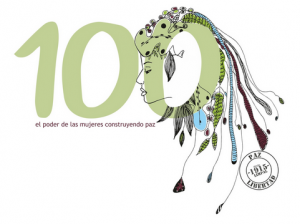
This year WILPF celebrated its 100th anniversary, and May 2015 marked two major events for WILPF chapters. WILPF Colombia commemorated the 100th anniversary by hosting a ceremony at the National University of Colombia celebrating WILPF’s achievements to further the Women, Peace and Security agenda. On this occasion, guest speaker Carmen Magallon, of WILPF Spain, presented on the history of pacifist feminism in addition to her insights and analysis of the role of women in peacebuilding. Similarly, in its centenary conference held at University House in Canberra, WILPF Australia celebrated 'Women’s Power to Stop War'. Keynote speaker Madeleine Rees, Secretary General of the Women’s International League for Peace and Freedom presented on the spirit of the Hague meetings, and Australia's Ambassador for Women and Girls, Natasha Stott Despoja, presented on 'A Global Agenda for Women, Peace and Security'. The Conference also featured panellist presentations on feminist perspectives and the next 100 years of WILPF action.
2015 High Level Review
By Cristel Taveras, image created by Prachi Rao
As part of our work to promote inclusive participation and to strengthen independent progressive voices in Women, Peace and Security processes, PeaceWomen created a space for public submissions to the Global Study on the Implementation of UNSCR 1325, and received and shared with UN Women 47 public submissions to the Global Study on the implementation of United Nations Security Council Resolution 1325.
Get a flavour of our report in the word cloud below, or read the full report, "Through the Lens of Civil Society: Summary Report of the Public Submissions to the Global Study on Women, Peace and Security". Thanks to all participating organisations and research institutes for their submission and engagement in this process!
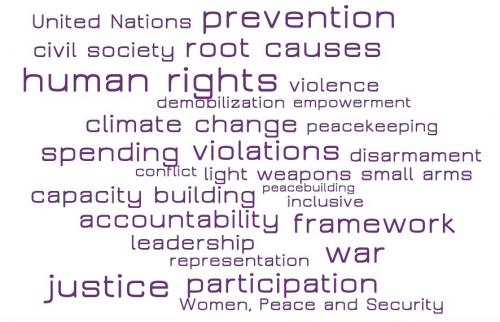
In Peace,
Maria Butler (PeaceWomen Programme Director), Abigail Ruane (PeaceWomen Programme Manager), Amali Tower (PeaceWomen Project Consultant), Cristel Taveras (Sub-Editor), and the PeaceWomen Team
Women's International League for Peace and Freedom
United Nations Office, 777 UN Plaza,
New York, NY 10017, USA
Tel: 1.212.682.1265 Fax: 1.212.286.8211
Web: www.peacewomen.org
PeaceWomen is a Programme of the Women's International League for Peace and Freedom (WILPF)
Follow us on Twitter | 'Like' us on Facebook

